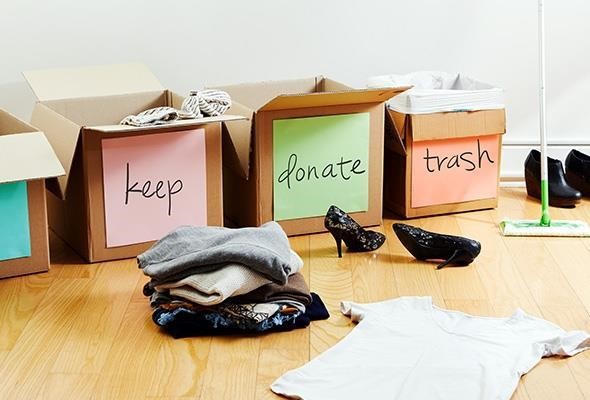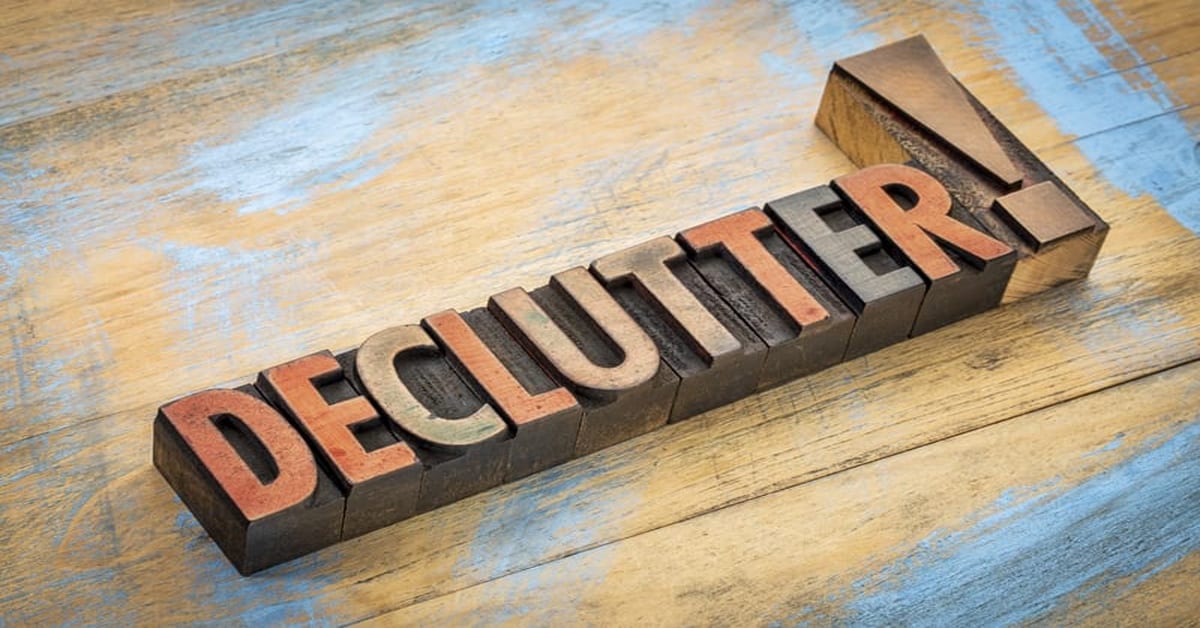Decluttering is one of the basic things you should learn to practice regularly if you want to go zero waste. You may think that decluttering is only part of the minimalist lifestyle but no, it’s not. To declutter is a crucial habit you should live through when you want to live less wastefully. You need to let go of things that waste your life and clutter the environment.
I asked lifestyle bloggers, organizing experts, home industry insiders, realty experts, minimalists, interior designers, and environmental experts on how to declutter and simplify one’s life to reduce waste. Learn from their insights and get inspired to commit to live with less.
What is clutter?
According to Lucy Milligan Wahl, owner of LMW Edits LLC, a boutique professional organizing company based in San Francisco, clutter is the uncategorized stuff in your house. If you look at something and aren’t sure what to do with it or where to put it, that’s clutter! It can be anything from unsorted mail to spare pen caps to lost socks to mismatched cups.
Heloise Blause, a kitchen blogger at HomeKitchenLand, values the clean and decluttered kitchen. As a chef, she really puts a lot of work in maintaining and organizing the kitchen that she’s in, for the food to look safe to eat, and also to generate much space for her to move freely when cooking. Cluttering for her is anything excessive or unnecessary. If you don’t use it but it’s taking up room in your home, it’s clutter.

Michele Vig, the owner of the organizing company Neat Little Nest, Marie Kondo-trained expert, and author of the new book The Holistic Guide to Decluttering, said that clutter is anything that gets in your way and reduces your effectiveness.
Physical clutter is clutter that reduces the effectiveness of a room or space in your home. Time clutter is clutter that is too many commitments making your calendar too full and reducing your effectiveness in managing your day. Mental clutters are thoughts that are when there are just too many thoughts in your mind making it difficult for you to focus.
To Ben Soreff of House to Home Organizing, clutter is postponed decisions. It is
the physical manifestation of procrastination combined with not having finished
storage solutions in your space such as not having homes for things.
For Laura Sandberg of Let Laura, clutter is anything that takes up physical or mental space that prohibits you from living a life you love.
For Sandeep Nath, the founder of RENEWALism, clutter is stuff at a physical, mental, and even spiritual level that doesn’t serve to take us towards becoming awakened beings. Clutter adds to the obscuration we manifest around ourselves that hide our inner power and distance us from our true selves – as aspects of universal consciousness.
Dangers of A Cluttered Life
There are many dangers with a cluttered life. Christine Wilcox of Letting Go Living More stated that a disorganized home can cause both mental and physical health issues.
A cluttered home is likely to have mold and dirt which can trigger allergies and asthma attacks. A cluttered kitchen gives a higher risk of stomach bugs, salmonella, or e-coli bacteria. Piles of stuff in your home, or clutter on your floor, could make a slip or fall more likely. And, clutter is proven to cause increased stress and anxiety, which can also lead to less sleep.
That statement was even agreed by Simon Elkjær of avXperten. He said that not only does clutter mess up your space significantly, seeing clutter in your home can demotivate you to complete tasks and make you unproductive.
The small things when piled up can affect how you function in your home and clutter prevents you from doing anything efficiently. When you have to dig through drawers of junk to find the thing you need, you end up wasting a lot of time.
Justin Syens of TOTL Real Estate Team warns of the effects of clutter: “Anxiety, stress, depression, relationships souring, decreased productivity. All of these things can lead to loss of employment, deteriorating relationships, and physical health decline.”
For Bonnie Schiffman of This Stuff Goes Bad, “The more things we have, the more things we need to remember, or look at, or think about, or clean, or throw away. Essentially, everything you own is most likely taking up some space in your mind as well.”
According to Katrina Green of Badass Homelife, there can be a physical danger if there are items on the floor that could lead to accidents and injury. Donna Roses of Donna Declutter adds, clutter can be dangerous for such simple reasons as being a fire hazard, blocking escape routes, tripping hazards, waste of money (such as a storage unit), gathering dust, causing anxiety.
Worst of all, one of the greatest dangers of a cluttered life is focusing and obsessing over cluttered spaces while ignoring your real dreams and goals and developing clear paths in life itself.
“If an object, person, or thought isn’t bringing you joy or enhancing your life, then that thing just takes up your limited space. The less free space you have, the harder it is to feel healthy, sane, and creative,” says Angel Pretot, French learning coach.
What is decluttering?
For Marla Stone of I-Deal-Lifestyle Inc., decluttering is categorizing into broad categories and then using clear and concise criteria, not based on feelings, but rather objectivity for choosing things you will keep versus what you will toss.
The best criterion to use is to ask yourself: “Will I use it? Does it serve a purpose? Is it sentimental? And do I love it?”
You don’t want to “should” yourself into decluttering. Instead, understand what you value in life and purge out what does not resonate with your ideal and current lifestyle. So if you are not into knitting any longer, donate or gift the knitting tools. Bring things into your life that makes sense with the current you.

This could be done through resale, donation, recycling, and as a last resort, trash, depending on the type and condition of the item, according to Lucy Milligan Wahl. Melissa Constantinou of HomemakingEngineered.com even recommends that you declutter relationships, your to-do list, and device content.
But to Katrina Green, decluttering tends to be the hardest for most of her clients since clutter and material belongings have a hold on people especially if they’ve been living in clutter for a long time.
Why Should You Declutter?
According to Lucy Milligan Wahl, there are a lot of reasons for decluttering. Less clutter is linked to lower stress levels, feelings of control and empowerment, and an ability to focus on true priorities in life.
However, why should you specifically declutter? You should declutter if your stuff is making you feel negative emotions! Listen to your gut. It’ll tell you if you have too much clutter.
Melissa Constantinou also said that you should declutter to lay the foundation for intentional living, where everything you own or everything you do serve you or serves a purpose in your home. You can free yourself from the overwhelm of random things piling up and not knowing how to manage them. Also, having a tidy and organized home just feels better because no one wants to be surrounded by clutter and mess.
Decluttering, for Stephanie Seferian of Mama Minimalist, is a powerful way to reduce feelings of stress and anxiety. Many adults—particularly mothers—attest that clutter creates anxiety, and evolutionary biology supports this experience. Order and symmetry gave our ancestors an advantage over predators, and humans, therefore, evolved to prefer tidy spaces. And while you likely feel scattered and anxious when your living spaces are untidy, decluttering ensures that you are living in a calmer state, where it’s easier to focus on what’s important.
Also, a decluttered home is much easier to maintain than a cluttered one. Americans spend an average of ninety minutes per day—or sixty hours per month—on household upkeep, including cleaning, tidying, and organizing. But when you own less, you have fewer items to dust, wipe down, organize, and put away. As a result, you naturally have more time to do what you love with the people you adore.
For Diana Stelin, decluttering a space has a mirroring effect on our psyche. As one cleans out their outside space, so does the internal clutter starts to dissipate.
Recommended Methods on How to Declutter
Media relations specialist Asmat Khan outlines the most popular space decluttering methods:
- Minimalist Game – In this method, you can start on the first day of a month, settling one item on the first day, two items on the second day, and so on.
2. Four Box Method – This is the method of setting up four boxes in a room and labels them, Undecided, Give away, Put away, and Throwaway, collect the clutter in the room and place it into one of the four boxes.
3. One Method – By getting rid of your mess every single day, in that way, you will be able to add decluttering to your everyday routine.
Heather Aardema of Root of Wellbeing‘s Method
Look at your things and ask, “Do I feel heavy or light when I look at this thing?”
If you feel heavy, it leaves the house–to a donation center, a friend’s, wherever, it goes. If you feel light, you keep it.
And before you buy anything new, you ask yourself, will this make me feel light in 6 months if I haven’t used it? Will I feel guilty looking at it? Will I even know I have it?
Christine Wilcox’s method:
1. Set a timer, just 10 minutes in the morning or evening, and do a quick move through your home, removing any items that have been gathered on countertops and tables and returning them to where they belong. Get all of the family involved, everyone should be helping as it instills the habits to keep things tidy.
2. Stack your chores! Make it a habit that you will put on a load of washing just before you set out the breakfast items. Or make it a habit that as the kids are eating breakfast you will unload the dishwasher. Making habits of regular chores and stacking them together stops things from building up and getting out of control.
3. Do clothing decluttering at the end of every season. For example, having just come out of the summer season, you’ll know which clothes you wore during summer, and which clothes you avoided (even in these strange times).
If you have a closet bursting with clothes you don’t wear, you are depriving someone else of the chance to love the item, and you’re increasing the stress in your life trying to rummage through an increasingly packed closet. Try to reduce waste by donating good quality clothes to thrift stores.
5 Things For 15 minutes a Day Method by Amy Tokos of Freshly Organized ,LLC
1. Remove 5 things a day from a space
2. Set a time for 15 minutes and remove items
3. Do one space or a part of a space: a kitchen drawer or cabinet.
4. Avoid setting aside a whole day to declutter…this can cause you to procrastinate because it’s such a big amount of time for the job.
Marla Stone’s recommended method:
- Clear the cluttered space first with bins or large bags without looking at a thing. Later after your area is cleared, set up empty containers to start broad categorizing everything.
2. Choose to keep what fits your lifestyle, then find a home based on where and how often you will use that category. Things you use daily, weekly or monthly are stored close by, while items used less often go further away.
3. Find permanent homes for your stuff while regularly assessing what meets your criteria will keep your space clutter-free forever. Also, move things according to seasons. You don’t want ski clothes in your face in summer, not bathing suits stuffed in pressure drawer space in winter.
4. Also, when you do make a mess, “will” yourself to put things away into their designated homes. Don’t needle or pressure yourself.. Just say, “I will stay organized.”
Stephanie Seferian’s checklist of clutter
In her book, Sustainable Minimalism, she offers a checklist of fifty-two commonly cluttered areas. Because quick wins at the outset will likely propel you to tackle harder spaces with more ease, this checklist starts in sentimental-free areas before slowly increasing in difficulty.
Complete just one checklist item per week; alternately, if you feel exceptionally motivated, cross out two or more in a single tidying session. And of course, if some items don’t apply, move right on to the next one!
Examples on the checklist include:
11. Master bedroom nightstands
12. Under master bed
13. Master bedroom dresser drawers
14. Master bedroom closets
15. Kid room nightstands
16. Kid room dresser drawers
17. Kid room closets
18. Kid room under bed
19. Toys and stuffed animals
Sherri Curley, aka The Practical Sort, and her 7 tips of decluttering:
1. Establish realistic routines and try to stick with them each day. The important thing is to avoid stressing out about it. Sometimes life circumstances get out of control so just do what you can and set realistic expectations. Keep in mind that your home does not need to be a magazine ready and you don’t have to be a Pinterest Queen or King. Systems that work for you, will work best. The goal is comfort and productivity, not a magazine cover.
2. Straighten nightly and return everything to their home spaces. Now that all your items have homes, be sure to return everything to them daily. Clear off countertops, desks, tables, etc. so each morning you awake to uncluttered surfaces.
3. Add a few minutes to your day. Wake 15 minutes early or limit the amount of social media, tv, electronics, etc.
4. Establish a task jar. Identify quick tasks that can be accomplished in 15 minutes or less. Each day with the extra 15 minutes, grab a task from the jar and knock it off your to-do list.
5. Set boundaries. Before playtime, electronics, dinner, etc., task the owners of backpacks, jackets, toys, etc. to place all items back in their designated homes. Make a game out of chores or use apps such as Choremonster.com to help make chores fun.
6. Minimize. Be thoughtful and intentional about what you purchase and bring into your home. Buy and keep what you love and need. Release the things that no longer serve their purpose. Think of it as keeping your home on a diet plan.
7. Schedule periodic whole house purges. Get rid of the things that no longer fit, are out of style, hold negative memories, are unrepairable, etc.
How to Start Decluttering

According to Amy R. Bloomer of Let Your Space BLOOM, LLC, “When it comes to decluttering an entire home, it’s important to start small and not to try and take on too much at once. I’d suggest a room-by-room approach that commences with the easiest space first. Creating small victories with rooms that are less intimidating builds the foundation and the momentum to tackle more difficult places.”
Bloomer also recommends starting with smaller rooms. Attempting to tackle a large
room first, such as a basement or a garage, often ends in frustration
and failure.
For Heloise Blause, most people have way more clothes than they actually need, so it’s the easiest place to start.
Dan Bailey, President of WikiLawn, says, The best way to start decluttering your outdoor space is, to be honest with yourself about what does and doesn’t need to be there. If you don’t use a tool regularly, put it away. If you’re not entertaining more than once a month, you also don’t need a ton of outdoor seating and other furniture outside, so you can put that away (if possible) until it’s necessary.
Really sit down and think about what you want the space to be. Pick one goal and focus all of your efforts on that. Get rid of anything that doesn’t further that goal.
For Chris Emery of Ordealist.com, you need to start decluttering by asking what you actually need and what you only want. Anything that you don’t absolutely need to be healthy and safe is optional and should be assessed. Look at the item and ask yourself, is this worth my time and attention, or will it save me time and attention for other things? If not, perhaps it should go.
Or, more profoundly, maybe the activity for which it is used should go. Sometimes, objects only exist because you have fantasies of using them for activities. Maybe you should let the dream and its accouterments go. Let go, be free.
Tips for Successful Decluttering
Caroline Clark’s simple tips (Organizing For The Overwhelmed):
- Start small, with one category (ie shoes) instead of the whole space (closet.) The Organizing process always looks worse before it gets better, and starting small with just one category keeps you from having a giant explosion of stuff all over the room.
2. Reward yourself along the way. Instead of looking at having an organized space as the reward for decluttering, set up smaller rewards that you earn as you complete parts of the project. . That way, you’re not being rewarded for the end product, which is further down the line, you’re rewarding yourself for showing up and doing the work.
3. Buddy up. Team up with a friend who also has a project they’re working on and text each other your progress every day at a set time. Having an accountability buddy dramatically increases the chance that you’ll stick with it.
Marty Basher of Modular Closets‘ Tips
- Tackle One Area at a Time. Decluttering and organizing can be a lot of work, but you can make it less overwhelming by tackling one area or room at a time. If the thought of setting aside 4 hours to declutter is too much, tackle smaller areas in shorter stints; one cabinet, one drawer, one cubby-you get the idea. Set aside 15 minutes a day, before you know it, you’ll be motivated to keep going!
2. Leverage unused space. Often bedroom corners or the space below your clothes in closets go unused. Good news, you can actually use those areas for storage. Corners are a great place to create storage in a kids bedroom, using corner shelving or a hanging a stuffed animal hammock. The space below your hung clothes is ideal for handbags, or shoes/boots or for baskets to house flip flops/slippers, winter accessories, etc.
5. Digitize papers, there is no worse cause of clutter than “papers”. Throw out papers that you do not need, shred the ones that include important information, take a photo of any you need to keep and store them digitally.
6. Fix broken stuff. Yes, that garage door opener that doesn’t work or the ice maker on the fridge. If it can’t be fixed, it’s time to say goodbye.
6. Organize bathroom cabinets. When was the last time you went through bathroom cabinets and purged expired toiletries, makeup, and medications? You’ll be surprised at how much clutter and unused items you’ll be able to throw away. While you’re at it, give those cabinets and drawers a thorough cleaning.
7. Improve Kitchen Functionality: Inventory and clean the pantry, fridge, and freezer. Check dates on everything in the pantry. Expired items, and you have them, must go. This simple task will more than likely create some much needed usable space. Do this on an ongoing basis.
8. Take stock of all your utensils. You should only keep the utensils that you use daily in your drawers and cabinets. Everything else might be necessary but only occasionally so box them up and store them in a place that is easy to get to. Use the same strategy for your dishes. Many people like to have different sets, i.e., holiday, fancy, special, etc., however, don’t need them all in your daily cabinets. Make sure that you have a nice matched ever day set that can serve 8. Store everything else for those special occasions.
9, Consolidate and separate. Instead of those four half-full jars of cinnamon, you keep buying because you cannot remember if you have any… Marry those jars into two, and keep one where you can see it, and the other with other “refillers.” Refillers can be brand new containers of things you already have, extra opened containers of dry goods, or things you got a ton of because you found a once-in-a-lifetime sale. Have a special place for these things. It will help you stay much more organized than trying to stuff multiples of the same thing into one spot. This will also help you use your pantry items more efficiently.
Joe Flanagan, Founder of 90s Fashion World puts decluttering success simply as “getting rid of whatever you haven’t used in a year! If it’s sitting there gathering dust, chances are you would be better off not having it!”
Stephanie Seferian says, “Know that decluttering an entire house is less of a sprint and more of a marathon. Stick with it! When the going gets tough, remind yourself why you started in the first place.”
How to Get Rid of Clutter for Good
Lucy Milligan Wahl teaches her clients to adopt trigger behaviors: new automatic patterns that contribute to an organized home, rather than the old patterns that cause clutter. These trigger behaviors are guided by one simple concept: when in doubt, do it now! They include: putting trash in the garbage (or recycling) as soon as you see it, putting items you no longer use or like in a donation pile as soon as you notice that they no longer serve you, and putting ideas or tasks on a checklist as soon as you think of them.
For Katrina Green, changing habits is the key. Habits are a powerful way to change pretty much anything you aren’t satisfied with. For example, if you tend to keep receipts and shove them in your bag with no specific location, try to consider getting a small envelope that you can store within your bag, so even if you are in the habit of keeping receipts, they are containerized and tidied, less clutter.
Ben Hardy of Vegan Recipe Bowl says, “The clutter got there for a reason, so we need to identify our clutter-making habits and put in place checks to avoid returning to them. Personally, I have to ask myself a lot of questions before buying anything now.”
Fred Blair of Awesome Hoops agrees. He says, “Carefully consider each purchase. Just because you can afford something doesn’t mean that you have to buy it. Think it over and see how you can fit it into your lifestyle and how much value you will get out of it.”
How Going Minimalist and Zero Waste Can Lead To a Richer Life
Decluttering is a process towards minimalism and going zero waste. If you can commit to living with less, you can reap many benefits, especially a richer life. Decluttering saves you money, allows you to find what you are looking for and most importantly be more productive.
Jennifer Willy of Etia.com says, “You are able to enjoy your holiday, even more, when you have a less cluttered home. A well organized and tidy home is easily navigable during the high stress that we experience in this season.”
For Katrina Green, “Being a minimalist allows you to find joy in non-tangible things, it helps you have a better relationship with yourself and your stuff. It’s the feeling of calm and serenity for me. As for practicing zero waste, at first, it was hard to find the swaps in the beginning but as I grew more and more fond of it, I have discovered a new way of life where I connect more with the earth. These practices have given me so much life and a deep connection, not just with the environment but it allowed me to find a community within it too.”
Angel Pretot said that minimalism has helped him choose more deliberately, focusing on the consequences of his actions. It has been crucial for his entrepreneurial journey because the actions he takes daily can cause my business to thrive or tank.
For Girish Shukla, it’s important to save new resources and let go of things that are not needed. While sometimes it can seem to be a daunting task to give up your possessions it is important to not forget this simple act is beneficial to the environment and for the mental well-being of the individual. Going minimalist and zero waste can really put things into perspective and with unwanted items out of your sight and use, it can help you to focus on things that are of true importance and add value to your life.
To Caroline Solomon of NEATLY Organizing, going zero waste and minimalist is not just an aesthetic choice, but a holistic one that can affect you inside and out. When you’re more responsible about the items you use in your day to day life, you can feel fulfilled knowing you’re doing your part to minimize unnecessary waste and negative
environmental impact.
By surrounding yourself with only the things you need, you’ll become immensely grateful for all that you have. And if you don’t have it, you can get creative with the items you do have. Finally, when you spend less money on items, you have more money to spend on experiences, which lead to a far richer life than owning a bunch of gadgets that you might only end up using a handful of times.
Ultimately, decluttering is a skill you need to master so you can live your life to the fullest while also not being burdened by clutter nor weighing down Mother Nature with the bulk of what you don’t use wisely.




